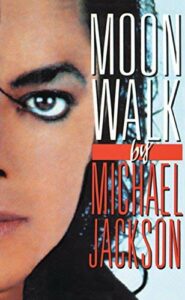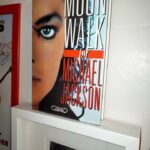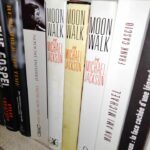“Moonwalk”
Michael Jackson
(Doubleday, 1988)
Any book review on my part is meant to be ambitious because I often keep this quote in mind: “It is easy to criticize”. By my lines, I wish to encourage reading and show that the book in question deserves the attention of readers.
However, this will to give my impressions can also apply to a book that no longer needs to be presented. The ambition is nonetheless strong, on the contrary, since I shall venture on a familiar ground for almost everbody and it is not easy to surprise and give a new insight. When you are a Michael Jackson fan, reading Moonwalk is a sort of prerquisite. So I wanted to approach this bookk that you all know so well to express my feelings, my emotions and my point of view. I feel that I can only express myself through writing and so I will try to carry out this mission.
Every time I turn the pages of Moonwalk, I feel like I’m holding a precious and exceptional document in my hands. Just think of it! The only autobiography of the King of Pop! The biography of an author written by himself… So much has been written about him that finally, shouldn’t we just go back to the source and dive into the writings of the main person concerned?… My question is legitimate, even if we must admit that, generally speaking and for many readers, this bibliographic concept may seem a little watered down by its author. It is true that talking about oneself in the first person is not easy, especially if one has to deal with personal subjects, such as shadowy parts and other difficulties in one’s life. It is therefore objective to think that Michael Jackson and Moonwalk are no exception to this rule. However, in order to moderate my remarks, I would evoke the shyness and humility that are integral parts of the personality of the King of Pop. The analysis of this book must take these aspects into account in order to better feel how authentic it is. I am weighing my words because, in my opinion, Michael Jackson gives himself up in a very interesting way in Moonwalk. So many people have written about him that the saying “If you want something done, do it yourself” can be applied to this autobiography, and is self-evident when you take the time to analyze those lines.
Michael begins his book by evoking his admiration for great writers, with the soul of a storyteller who knows how to captivate his readers by making them go through every human emotion. The King of Pop starts his autobiography in a very humbling manner, with the desire to be able to tell a story to his public, like a step by step, without considering himself a great author. However, he allows himself a quick parallel with his talents as a songwriter, which are briefly mentioned. Indeed, each song is a story in itself that can make people feel like singing, dancing or crying. The comparison is short-lived, as Michael Jackson goes so far as to speak of a sketch to be refined in the editorial scheme of a book. In his analysis, I can feel his sense of no artifice or special effect needed to sublimate an author’s work: there is only the magic of words assembling to make the reader respond, and the connection between two people across the pages. So as a reader, I will try to demonstrate that MJ’s wish was granted and that I was consequently enriched by that reading.
How could it be otherwise? His story is incredible and no storyteller, even the most talented, could have imagined it. It is a great life lesson to read about an artist who started singing at the age of five and reached number one on the charts at the age of twelve. Generally speaking, the family context and childhood in a biography are important aspects to analyze any personality in its destiny. This is all the more true for the King of Pop, the seventh of nine children, who became the singer and leader of a family band at an early age. In his memories, Katherine Jackson, his mother, remains the embodiment of perfection. The singer would say it repeatedly in various interviews throughout his life, and again Moonwalk is no exception to the rule. Thus, I can not say that this book brings an added value to decipher the relationship between Michael Jackson and his mother. However, my point of view is different regarding the one he had with Joseph Jackson whose complexity is well known. On this subject, I remember a discussion with a close collaborator of the King of Pop. We were talking about bringing together the skills of different people to carry out a project. This collaborator started to tell me an anecdote on this subject. One day, Michael told him that his father was a genius. The collaborator was a little surprised by this statement, as MJ had expressed his resentment against him many times, and he pointed this out to him. To which the star replied that it took a genius to start from nothing in Gary and achieve that result. This anecdote stuck with me, as I found it very interesting. So, reading Moonwalk again, I feel that Michael elaborates on this statement about his father and the way he managed his sons’ careers. Of course, Michael does not hide their lack of communication, going as far as to define his father as a mystery, nor the beatings he got from him. Still, he tries to tell some happy memories, apart from the music. He evokes the greasy and powdered doughnuts that Joseph would bring back home in a bag at the end of his working day at the factory, or the rides they took at an amusement park. But as the author says, these images remain blurry in his mind, even if we can feel his need to hold on to them. So it is through music and his role of manager that Michael will express himself about his father, being aware that the latter had done his best to protect his interests and those of his brothers. Always on top of what was happening in the show business world, Joe had told his son that, if he took the trouble, he could dance on one leg like James Brown. In his writings, the star shows us how important his father was to get to the top, even if we can feel he is bitter over the fact that the manager took precedence over the father.
Nostalgia is not forgotten when the King of Pop evokes his brothers. For nothing in the world, he would forget what he defines as a complete brotherhood. From a young age, they were always together and it was his bond with them that gave him the strength to cope with so much work and grueling days during his childhood. Without the book Moonwalk, we would never have known how MJ saw his brothers, especially Jermaine. As we read the book, we realize how close the King of Pop felt to his older brother as a child, to the point of taking him as his model and trying to imitate him in his early singing days, while proudly collecting his old clothes. The success of the Jackson 5 did not alter this brotherly complicity, and when Jermaine chose to stay with Motown, it was a real tragedy for Michael not to see him on stage on his left. Nowadays, we may not perceive these brotherly ties as much, as Michael himself had become emancipated from his family with his solo career. However, he regrets this estrangement from each other, adding that the various marriages contributed to all this, not without saying that it was inevitable. His wish not to grow up is also expressed in this way…
These personal reflections on himself were no small task for the author. He himself says that he wants to preserve his privacy and he did so in writing the book. That’s why readers looking for juicy details might be frustrated. Considering his shyness and modesty, this project is clearly Michael Jackson’s own vision, without any pressure from a publisher trying to surf on sensationalism to increase sales. The star evokes some relationships known to all, without really developing them, but why blame him? Cosmetic surgery is also discussed, and as in the interview with Oprah Winfrey (that occured five years later), he only admits two operations. We can thus perceive his need to justify himself, as the topic gets talked about a lot, and give his own version of things. Not a very pleasant subject for the author, but probably unavoidable. I would classify the relationship with the press in the same category, as the gap will grow even wider during the 90s and 2000s. So this is not what I want to keep from this book, and that’s why I don’t want to draw out this paragraph and be true to myself. This is very personal, but for me, Moonwalk has other, much more valuable assets.
In this journey from Steeltown to Epic, through Motown and the Philly Sound, I have the feeling that Michael Jackson has never been so much about music. A great number of protagonists, from Gordon Keith to Quincy Jones, through Berry Gordy, and Gamble and Huff, are present in the singer’s evolution and the learning. This aspect will never be really approached in his various interviews, except the one on MTV with Alex Coletti in 1999. I don’t deny the formula saying that “It comes from above” and his mention of “the giving tree” later on in his career, but it definitely was in his autobiography that he tried to analyze all that.
At 2300 Jackson Street, we are immersed in the rehearsals of the Falcons, Joseph’s band, as one of the first triggers of a child’s artistic revelation. We then feel like discovering James Brown’s and Jackie Wilson’s musical worlds. Through singing and dancing, a little boy is transcended by these influences, to the point where he manages to surpass them. Amateur competitions follow one another and the Jackson 5 begin to realize that they can no longer limit themselves to Gary: little by little, the United States, then the whole world, will become vast. Through Michael’s eyes and enthusiasm, we get to live his first experience in the studio with Gordon Keith of Sweeltown Records. His joy of taking a new step is told as one of the most beautiful tales, but it is a confirmation of the talent of Michael and his brothers. Through their father/manager’s perfectionism, they realized that they had what it takes to be professionals. This was an enriching experience for the next steps like winning the Apollo amateur contest in New York or auditioning at Motown in Detroit. In this regard, I liked the way Michael told about this pivotal event in Moonwalk. He says that it’s all etched in his memory, and for good reason, since that audition was a turning point for him and his family. The author takes his time, expanding on this subject over several pages and going into minute details, such as sandwiches brought by Katherine for the trip and an ironed shirt not to be wrinkled. Michael would sing years later, “Every day, create your history.” This is what it is all about here: in this waiting mixed with stress, time seems longer and it is with great skill that the author makes us share this feeling. Through Michael’s words, we travel from Gary to Detroit in the Volkswagen minibus and we accompany Joseph and his children on the road to their destiny, which Michael, with his artistic and childlike soul, tenderly compares to a game of Monopoly. This successful audition and the departure for California, presented as paradise, introduces Berry Gordy as the main protagonist of this road to success. The Jackson 5 had four number one hits, far beyond the expectations of the Motown boss who had predicted three! The future King of Pop, then twelve years old, drank his words, observed and learned during studio sessions and television sets. This idyllic picture fades over the pages as the singer matures and becomes more aware of his own talent. This too-measured framework does not suit him anymore, he who would like to compose and produce his songs, while Tito and Jermaine cannot play the guitar and the bass on their own albums. The artist expresses all his frustration of not being heard and feeling like a kid. He is still a teenager when he expresses the awareness of what he wants for his career. He just wants to fly, and his faith in himself, from this period, is one of the keys to perceive the artist he would become as an adult.
In this case, changes are inevitable. The Jackson 5 became The Jacksons when they signed with Epic Records and were then able to write and produce their first songs in the Philadephia International Records fold with producers Kenneth Gamble and Leon Huff. It was only a few songs, but the smooth transition was beneficial to Michael’s songwriting journey. This is how he starts to tell us the genesis of his different songs, which is literally exciting, especially concerning the albums of his discography at Epic which are discussed in detail. Without Moonwalk, I’m not sure I would have been able to get his impressions on “Blues Away”, his first composition, nor on the autobiographical meaning of “That’s What You Get For Being Polite”, as well as on the meeting with the executives of Epic in order to produce Destiny entirely and not to remain in the lap of Gamble and Huff. It is with a lot of objectivity and hindsight that the singer recognizes that they didn’t really hit it off, without disputing their talent.
The shooting of the movie The Wiz in New York is obviously a very important moment in the story. It is related to human relationship, through the joy of reuniting with Diana Ross, but also Michael’s first experience of several months away from his family, except for La Toya. The musical aspect is not left out, through his first collaboration with Quincy Jones on the film’s soundtrack. The latter acts as some kind of a Berry Gordy of adulthood but with a certain nuance. The producer leaves a total freedom to the star, while guiding him by his numerous advices. Michael mentions his fabulous “ear” as an arranger. It is in this spirit that the Off The Wall project, his first solo album at Epic Records, was developed and released in 1979. In his writings, Michael keeps on telling and analyzing the songs in detail. He even compares Off The Wall to Triumph, the Jacksons’ album that would be released the following year. Even though he evokes tracks like “Time Waits For No One” or “Everybody”, he can’t help but draw a parallel with the Off The Wall songs, as some sort of competition between his brothers and Quincy Jones’ team, illustrating the first inclinations of a solo career taking precedence over the band. His confession about Quincy’s sound, which he considers more profound, goes in this direction.
The comparison between the albums produced by Quincy and those of The Jacksons will not go any further though, since Victory remains unmentioned in Moonwalk. How could it be otherwise when Thriller turned everything upside down, in every sense of the word, by becoming the best-selling album of all time? What seemed impossible to Quincy Jones and Rod Temperton during the genesis of the project, Michael Jackson dreamed of it, and his memories related to the project remind me of the time when I would devour the album booklets trying to analyze and decipher the credits. The author then brings up the names of Toto band members like David Paich and Steve Porcaro, not to mention other collaborators like James Ingram. This is really one of the attractions of Moonwalk for me, to the point of seeing it as an exception. The King of Pop shows off his team here, although he usually prefered to keep a bit of a secret behind the studio door. Other names coming up in his account, such as Dexter Wansel, Louis Johnson, Tom Bähler and of course Bruce Swedien, have a certain flavor coming from the mouth (or rather the pen) of the master.
All this is not toned down when it comes to music. Michael Jackson does not hesitate to tell that the Thriller adventure was not a long quiet river. Just like with “She’s Out Of My Life” on the previous album, the singer evokes his difficulties to perform “The Lady In My Life” with Quincy Jones asking him to take a pleading tone to give more authenticity to the result. All this was nothing compared to the first failed mixing of the album that plunged the artist into anger and tears, as a sign of his perfectionism that is so prevailing throughout these pages. His feelings are the same when he explains straightforwardly that he was not satisfied with the staging of the Victory Tour, while these concerts presented him under the new biggest star on the planet after the Thriller landslide. However, even if he admits that he did not want to participate in this tour, he does not go as far as to mention the tensions with his brothers. He had simply gone into another dimension as a solo artist, but this subject that could be classified in the family domain is above all musical for him, which brings a certain modesty in his writings. That’s why it’s easier to tell why he wasn’t satisfied with his performance in the Motown 25 show, even though this performance has become legendary. The highlight of that evening celebrating the 25 years of Motown could have been the return of Jermaine with his brothers, but it was to reckon without the Michael’s will to perform “Billie Jean” (ah, the solo career which takes over again!).
This performance started with a hat, a glove and a sequined jacket that would remain the iconic accessories of a hit song that is just as iconic. This song, regularly quoted in the book, is another element of the story the author takes his time writing about. He wants the readers to understand its importance, just like its video, whose visual effects are an integral part of the success of Thriller and revolutionized the 80s. About the rehearsals for Motown 25, Michael Jackson then offers a moment of sharing with an immersion in his dancing soul. The contrast is striking between this moment of solitude in his kitchen, letting himself be carried by the music, as he says, and the moment when he opened his eyes in the middle of the stage in front of a crowd of people, once his performance was over, as if he didn’t belong anymore. Beyond the video that would remain forever in the history of music, the star immortalized this moment with his own words and writing, like a turning point in his life.
A life that seemed to be ahead of him then because Moonwalk was published before he was thirty. It is usually at the end of a life that one wishes to publish one’s memoirs, and maybe this is the most frustrating thing about this book: we would like to read what happens next! The parts dealing with the Bad album and recounting some disagreements with Quincy Jones seem to foreshadow Michael Jackson’s choice not to continue the adventure with him in the 90s. I would have liked to read his memories and impressions on this subject. We would have appreciated his own analysis on the songs from Dangerous and HIStory, without forgetting some artistic aspects like his choices of producers and other studio anecdotes. It would also have been interesting to read his feelings about the business, his marriages or becoming a father during the 90s. I’m not saying that Moonwalk was written too early, because in the middle of the Bad Tour and at the peak of his fame, a look in the rearview mirror by the King of Pop was legitimate. This book could have been the first volume in a series of autobiographical books whose releases would have been great events for his fans.
Throughout the book, Michael Jackson expressed how precious this life is, insisting on the importance of taking care of his health. Referring to many stars who were gone too early, victims of their own excesses, he aspires to another destiny at the dawn of his thirties. He even quotes Elvis Presley, saying that there is no comparison between Presley and himself, and that he is interested in how the latter destroyed himself in order not to do the same.
Do these lines simply express an example not to be followed that he wholeheartedly believed in at the time? Or is it an attempt to hide a deeper evil, such as his fear of not being able to escape his fate?
All this is disturbing… But as Michael Jackson himself wrote in Moonwalk:
“When I take on a project, I believe in it 100 percent. I really put my soul into it. I’d die for it. That’s how I am.”











